Rafael Khakimov: ''How to continue The Golden Horde? We have two topics…''
How Oxford received the Institute of History’s monograph, whom our historians will work with and the cost of education at western universities
These days the presentation of The Golden Horde in World History in English printed by the Mardjani Institute of History and University of Oxford together with TAIF PJSC took place at Oxford. In an interview to Realnoe Vremya, director of the institute Rafael Khakimov who returned from The Foggy Albion told how Britons enthusiastically received the Kazan citizens and their scientific baby. The historian also told what the Oxford school is, the cost of education at the most elite universities of the world and shared plans to conquer scientific establishments of Europe.
Enter European scientific world
Mr Khakimov, to start with, could you tell about the trip and presentation of the English version of The Golden Horde in World History?
It was very decently. We expect it to be so. We are glad that we almost managed to hold a very good event, even too good. We did not expect people from the city administration (deputy mayor), embassy, Ministry of Foreign Affairs (head of Commission on Compatriots Living Abroad) to come. We did not expect the officials to be interested except scientists. In addition, the deputy mayor came and greeted us. We thought he would go then as it usually happens, but he sat, listened and said: 'I am bad at History and I would like to know more about Tatars.'' He stayed almost till the end until he was bothered by the city administration – work was waiting. The event lasted for two days. In this respect, outwardly, it was very decent: not just a traditional round-table talk, seminar, presentation. The ministry worker thanked us and said everything passed decently. The work with their compatriots is also important for them. Tatars from Europe – the so-called Alliance of the European Tatars – visited the presentation, they listened. The World Congress of the Tatars also was there. The format looked this way.
Whom did you go to England with?
With our institute workers and the Alliance of European Tatars. We had two goals. Firstly, we started to work on the leaflet of Tatars in Europe – it is a temporary name. We needed to discuss the leaflet plan of the book with scientists from Hungary, Poland, the Russian Academy. We always do it: even before writing this book (Editor's Note: The Golden Horde in World History), we gathered in Leiden (the Netherlands), discussed who will write, who will be in the editorial. Here we repeated it to start this book.
We also had an important goal – to contact Tatars from different countries to know where Tatar burials are. Minnikhanov set us this task – to find out where graves, undocumented cemeteries are. And, of course, we had a presentation – it was the most important part of our trip. A trilateral event took place – Institute of History, Alliance of the Tatars and World Congress. The University of Oxford was the organiser.
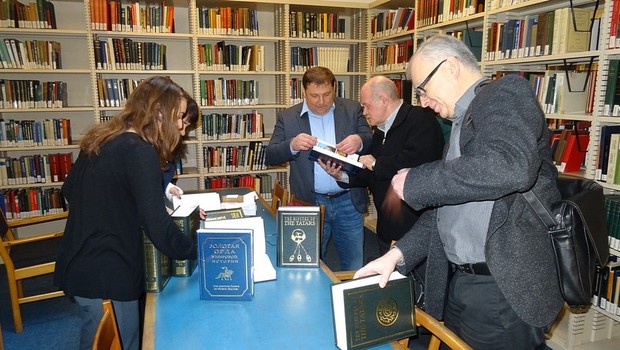
''We are glad that we managed to hold a very good event, even too good. We did not expect people from the city administration (deputy mayor), embassy, ministry of foreign affairs to come.'' Photo: Institute of History of the Tatarstan Academy of Sciences
Who supported your trip and publication of the book?
The trip is our business affairs, there is a fund for trips. As for the money for translation and publication of the book, it is TAIF group, many thanks for it. They managed to do everything within little time. It is not cheap for us to publish. But it is an important publication not only for us but even for Oxford because they offered the topic of the Golden Horde but they were not sure how important it was for history. In other words, they did not have experts and invited Marie Favereau from Sorbonne: now she is working at Oxford. When the book was issued, both Oxford and Cambridge (they are jealously observing what is going on at Oxford) consider this topic major, strategic, long term. So Sorbonne has also joined, Warsaw and Hungary have been studying this topic for a long time. We officially presented the book in the library, they had had nothing similar about the history of the Tatars. So it has been the first work in English that is there. For us it is very important to enter the European scientific world because everything starts with university there: journalists, politicians base on university, they set the pace. If we want to change the views on Tatars from negative to positive, we should start with university. We already have a scheduled presentation in Warsaw. A real tour is prepared where we will look for burials and simultaneously present this book and seven volumes of The History of the Tatars.
Mr Khakimov, what does Oxford know about Tatarstan, Tatars in general?
Except Marie Favereau who knows this issue well, visited us, wrote a thesis about the Golden Horde, mamluks, others have a superficial understanding because the Byzantine Empire traded with the Golden Horde. That famous Oxford scientist who deals with the Byzantine Empire has heard something. Experts in the Middle Ages also know something: there was an invasion somewhere, an influence on Tatars – at this level. But this topic did not become an area with its department. Cambridge worked with them on numismatics – they have been dealing with this topic for a long time, now they are covering it more globally. They are late, we took the lead with Oxford. But they are also our partners as well as all leading universities. As for Harvard, it had famous Edward Keenan who recently died. At the moment, only the young is there. But the Keenan school remained: he studied the Golden Horde, the Khanate of Kazan. He even wrote a PhD thesis about the Khanate of Kazan, Tatar-Russian relations. They have quite a good group of European experts from Italy, Serbia, Bulgaria, Hungary.
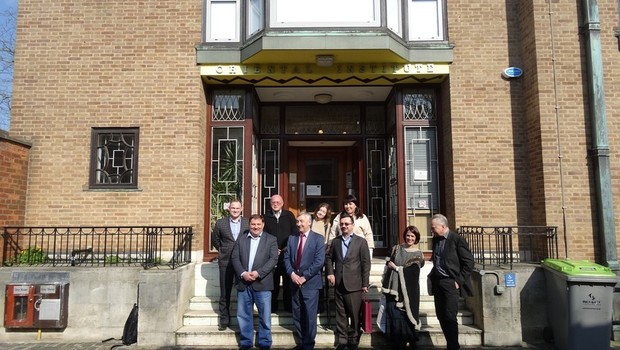
''For us, it is very important to enter the European scientific world because everything starts with university there: journalists, politicians base on university, they set the pace.'' Photo: Institute of History of the Tatarstan Academy of Sciences
You already said about the Oxford deputy mayor. What functionaries or British elite else did you manage to talk in England?
A lord was there (I don't remember his name). He was interested, he was sitting and listening. We had a very busy schedule ourselves. We did not plan any official meeting. They came on their own, were at the meeting – it is more than enough. We did not have an official trip, it was purely scientific, not political.
How did the representatives of the Western scientific community say about the book? Were it criticised?
The thing is that there was nobody to criticise anymore (laughing). 44 authors are here – they are best of the best. The approach is the following: we always choose the best in the world. This is why there is no room for criticism. We are quite critical ourselves: when work ends, we see something was not completed, not because we tried bad but because this part was not examined. For instance, economic issues have not been studied well. The Moscow University has noted scientist Karpov, he is working in the Venice archives. There is a scientist at Sorbonne who studies commercial and economic relations of Genoa with the Golden Horde. Uli Schamiloglu from University of Wisconsin-Madison worked on it in the past but did not continue. Marie Favereau continues working on the economic aspect. It is a big disadvantage that we don't know how the economy was built. Those who deal with weapons don't know where these ore deposits are, where metal to forge sabres came from. There are such gaps. Probably we can say these are disadvantages not because we don't put effort but because we did not start doing it. We worked on upper layers, political layers, the culture because we needed to say that Tatars are educated people to change the impression. The Hermitage and we prepare the third exhibition. We started with art to say it is a civilisation, not wild people. Exhibits influence the museum visitors well.
Is Oxford interested in further cooperation?
Yes, it is seen. And we wanted to push them. We would like them cover the topic wider, not choosing one employee but work with postgraduates, permanent workers. The appearance of the joint endeavour means it is important for them.
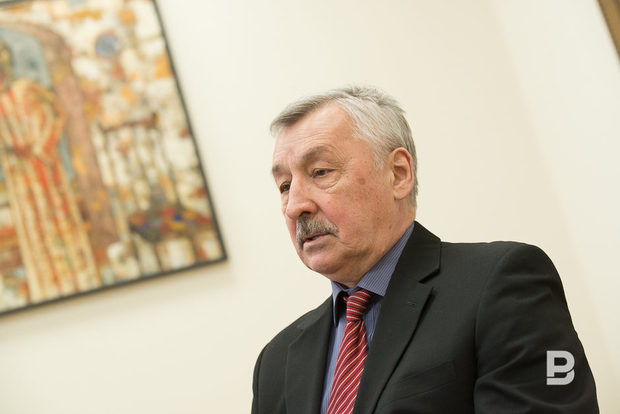
''The system is the following there [at Oxford]: if you have talent, nobody asks you how much money you have, whether you are poor or rich. You enter without mentioning your income''
Oxford education system
As far as I am concerned, Oxford is a group of colleges united under one name, that is to say, a brand…
Yes, there are 40 colleges.
How does the Oxford academic system work?
Their colleges are independent. They plan and make money on their own. The rector [of the university] exists only for official events, he can't give orders. Their colleges are independent, they don't have a general vertical of power. Many of them duplicate each other, there is a competition. They are fee-paying, but their cost is not very high – about £9,000. For instance, Harvard is at $24,000, while Stanford is $25,000. The system is the following there: if you have talent, nobody asks you how much money you have, whether you are poor or rich. You enter without mentioning your income. When you entered, it becomes known who is ready to pay for you (funds, interested companies). If nobody pays, you study for free, the university even grants scholarships. I know the same thing happens at Harvard. Level and prestige are important for them, not how much money they made.
Is it true that Oxford is a university where English aristocracy studies? Or is there room for human beings, plebs?
Plebs can enter if they have talent. Nobody asks whether you are a lord, who your ancestors are and how much money you have in the bank. You just enter. Another thing is that the rich start to educate their children when they are kids: the best kindergarten, the best school, the best college, the best university – this system works, of course. Yes, a half of prime ministers graduated from Oxford, same Churchill. But there are not any artificial limits.
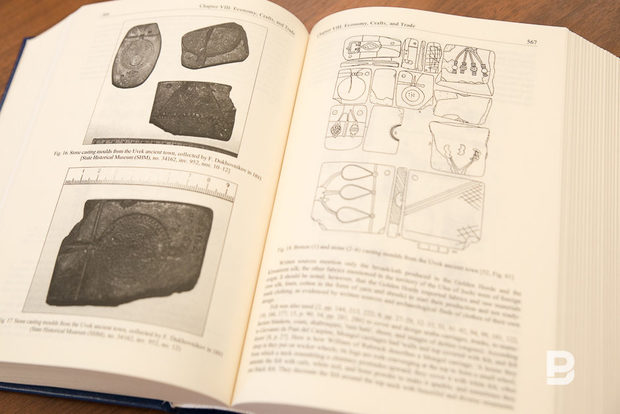
How to continue The Golden Horde? A question immediately arises: what will happen after this book? We have two topics as continuance. The 750th anniversary of the Golden Horde is the first topic. <...> Russian-Tatar relations during the Golden Horde era is the second topic, which became urgent a long time ago
From English to world universities
Have you had any new ideas and found new authors for you from the scientific process?
Any conference of this kind presupposes a backstage party. Sometimes backstage talks are more important than the very report. We often know each other, what will be presented and said, though discussions are important and interesting. But backstage work is more important: we have an opportunity to gather such a group of scientists who can create new projects, new approaches in one place. How to continue The Golden Horde? A question immediately arises: what will happen after this book? We have two topics as continuance. The 750th anniversary of the Golden Horde, formal separation of the Golden Horde from the Mongol Empire, or, more precisely, Talas Trilateral Agreement (1269) of the Chagatai Khanate, Hulagus and the Golden Horde is the first topic. According to it, if Kublai Khan went to war against them, the three parties would defend together. It will be celebrated in Kazakhstan and Tatarstan in 2019. It needs preparation.
Moreover, there are different points of view on the Golden Horde heir. Kazakhstan actively insists it is the heir. We can't be against. But everybody knows about Tatar states. They were defined on maps as Tartaria, not Mongolia, even if people talk about the Mongol Empire.
Russian-Tatar relations during the Golden Horde era is the second topic, which became urgent a long time ago. We eliminated the ''Tatar raid'' from books, but it wanders in the media, opinion journalism. This is why we need to clarify what relations they had. What does the Horde Rus mean? It is topical to cover it decently. Today Russia has good potential in this area. In this respect, first of all, the Moscow University will help. Many scientists and doctors appeared in regions, many researchers defend their theses on this topic. I think we will have to study these two topics and present it to the world in the next two years.
You said there will be a European tour with the presentation of the book. Could tell where you will present the book and when?
In Turkey. Time has not been arranged. We translated Tartarika atlas, all maps have been translated, there is a model. We need to print it in Turkey. This is why the date of our trip to Turkey is the question. It is certainly known that we will be in Poland together with the Archive Administration of Poland at the Warsaw University on 7 and 8 June. They will demonstrate all archives about Tatars (about 700 documents). We will decide how to work with this material further on because it is a lot. Neither we nor they are able to do this job without help. The question of digitalisation arises. The presentation will take place there at the same time. The 620th anniversary of the presence of Tatars in Poland and Lithuania will be celebrated in Lithuania at the end of June. Some of the workers will go there, a presentation will be there. Then we have two scheduled trips to Germany: one will be at the end of April (to the north) and the second one in June (in the south). We also need to visit Hungary this year, a presentation will be there. Sorbonne is on the horizon, but it is a plan. Uzbekistan is scheduled for September. Minnikhanov is also going there. We are going to hold a conference and presentation there.
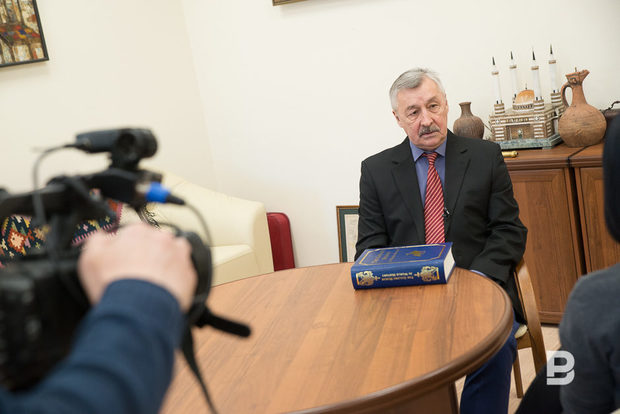
''We will be in Poland together with the Archive Administration of Poland at the Warsaw University on 7 and 8 June. They will demonstrate all archives about Tatars (about 700 documents)''
Are you going to cross the ocean or visit Asian countries to present the book?
Not yet. Too many events within one year. The trip fund doesn't have much money. We combine different programmes: when we go, we deal with burials, have presentations.
Thank you for the talk, Mr Khakimov!
Thank you for covering. We are very thankful TAIF because they understood the importance of the historic event. We still don't understand it completely: we entered Europe, started with the best university of the world. It is support for us. Now we can go to any country of the world say: ''We were at Oxford. Do you want to work with us or not?'' Nobody will refuse for sure. Moreover, Cambridge is concerned. As soon as two leading universities of the Great Britain express their opinion, others will add it as scheduled work.